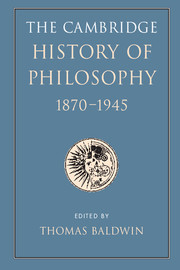Book contents
- Frontmatter
- Contents
- List of contributors
- Introduction
- I 1870–1914
- 1 Positivism, Idealism, and Pragmatism
- 1 Positivist thought in the nineteenth century
- 2 Neo-Kantianism: the German idealism movement
- 3 Idealism in Britain and the United States
- 4 Idealism in Russia
- 5 Bergson
- 6 Pragmatism
- 2 Psychology and Philosophy
- 3 Logic, mathematics, and judgement
- 4 Philosophy and the new physics
- 5 The idea of social science
- 6 Ethics, politics, and legal theory
- 7 Philosophy of religion and art
- Interlude
- II 1914–1945
- Biobibliographical appendix
- Bibliography
- INDEX
- References
2 - Neo-Kantianism: the German idealism movement
from 1 - Positivism, Idealism, and Pragmatism
Published online by Cambridge University Press: 28 March 2008
- Frontmatter
- Contents
- List of contributors
- Introduction
- I 1870–1914
- 1 Positivism, Idealism, and Pragmatism
- 1 Positivist thought in the nineteenth century
- 2 Neo-Kantianism: the German idealism movement
- 3 Idealism in Britain and the United States
- 4 Idealism in Russia
- 5 Bergson
- 6 Pragmatism
- 2 Psychology and Philosophy
- 3 Logic, mathematics, and judgement
- 4 Philosophy and the new physics
- 5 The idea of social science
- 6 Ethics, politics, and legal theory
- 7 Philosophy of religion and art
- Interlude
- II 1914–1945
- Biobibliographical appendix
- Bibliography
- INDEX
- References
Summary
WHAT IS NEO-KANTIANISM?
For contemporary philosophers it is safe to say that much, if not most, of recent philosophy is either directly or indirectly indebted to Kant. Paul Guyer and Allen Wood write in their introduction to the new Cambridge translation of the Critique of Pure Reason: ‘all modern thinkers are children of Kant, whether they are happy or bitter about their paternity’ (Kant 1781, 1787 [1998: 23]). Although this sentiment has been prominent for some time, it has not always been the case. Indeed, some of Kant’s contemporaries prophesied that he would be soon forgotten, and his German speculative idealist successors appeared to go so far beyond Kant that he was no longer recognisable – hence Kant was almost forgotten. That philosophers of the late nineteenth century and the twentieth century not only remember him, but also maintain that philosophy since Kant is the attempt either to build upon him or refute him, is due in large measure to the German idealist movement of the last decades of the nineteenth century and the first several decades of the twentieth century. This is the movement known as Neo-Kantianism.
Despite the significant role that the Neo-Kantians played in emphasising Kant’s importance, there has been little work done on this movement. Writing in 1967 Lewis White Beck observed that ‘There is very little material in English on Neo-Kantianism’ (Beck 1967). This is still true today, although there have been several recent German scholars who have attempted to draw attention to certain figures, or to certain aspects of the movement as a whole.
- Type
- Chapter
- Information
- The Cambridge History of Philosophy 1870–1945 , pp. 27 - 42Publisher: Cambridge University PressPrint publication year: 2003
References
- 5
- Cited by



